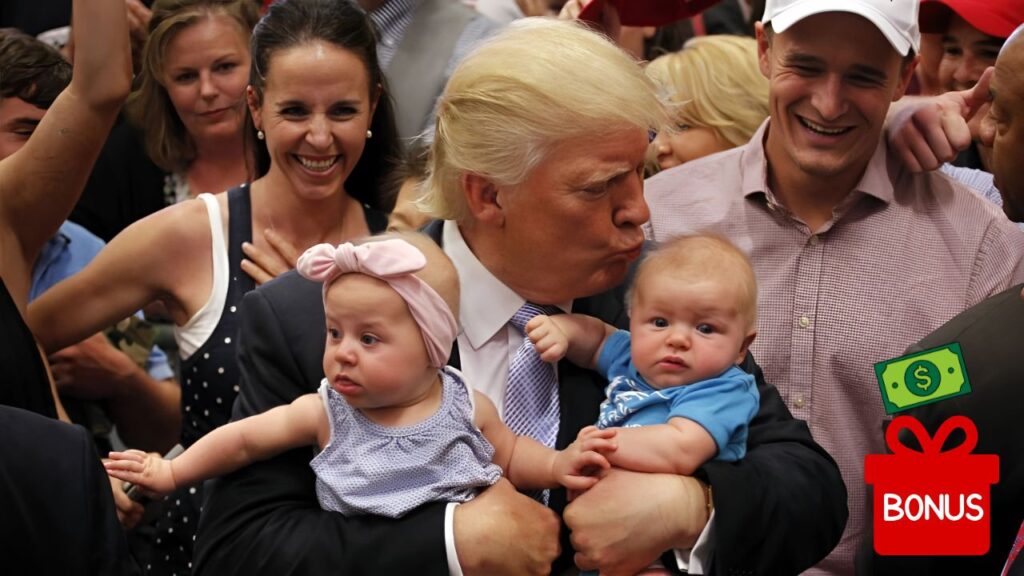
$1,010 Bonus: The newly signed One Big Beautiful Bill Act is shaking up how families can save and invest for their children’s futures. At its core, the act introduces a unique government-supported savings plan known as “Trump Accounts,” designed to provide financial momentum for millions of American kids. President Donald Trump’s “big beautiful bill passed” includes a new savings plan for children with a one-time deposit of $1,000.20 Bonus from the federal government for newborns.
Who Can Open a Trump Bonus Account?
Eligibility: Kids born between Jan. 1, 2025, and Dec. 31, 2028, who have a Social Security number, qualify automatically for a $1,000 starter deposit from the government into a Trump Account.
Other Kids: Children born outside these years can still have an account, but won’t receive the government’s $1,000 jumpstart.
Tip: If your child is eligible for the free $1,000, open the account—there’s no catch for taking advantage of the government’s seed money.

How the Account Grows: Contribution & Investment Rules
Annual Family and Employer Contributions
Parents, grandparents, and relatives can contribute up to $5,000 a year until the child turns 18. The total includes employer contributions, which can go up to $2,500 per year.
Any money in the account must be invested in index mutual funds or exchange-traded funds like those tracking the S&P 500, minimizing risk and encouraging steady long-term growth5
Note: The $5,000 annual cap may be adjusted for inflation.
Accessing the Money: Withdrawal Rules
Kids can’t touch the money until age 18.
From age 18 onward, accounts operate like a traditional IRA—taxes on gains apply, and you can withdraw anytime after age 59½ without penalties.
Before that age, funds can only be withdrawn penalty-free for qualified education expenses, first-time home buying (up to $10,000), or starting a new business.
Complications & Considerations
Not all children get the free $1,000. Those born outside the 2025–2028 window or those who lack a Social Security number only get access to the tax-advantaged account—not the starter funds.
Employer contributions sound great, but few companies have commented on providing them, partly because the rules and IRS guidance remain incomplete.
Other accounts, like 529 plans and Roth IRAs for teens with earned income, may offer more favorable tax advantages for college or flexible family savings. Compare carefully before locking in your strategy.
Side-by-Side: Key Trump Account Scheme Details
| Feature | Detail |
|---|---|
| Eligibility | Kids born 2025–2028 (citizen + Social Security Number) |
| Starter Bonus | $1,000.20 from U.S. Treasury (one time) |
| Who Can Contribute | Family, friends, employers |
| Maximum Contribution | $5,000/year (includes up to $2,500 from employer) |
| Fund Investments | Only low-cost index funds or ETFs |
| Access Age | Withdrawals allowed from age 18 |
| Early Withdrawals | Allowed for education, first-time home, starting a business |
| Tax Status | Tax-deferred growth, taxed at withdrawal as income |
| Available From | Accounts launch expected July 2025 |
Tips for Real Families
If your child is eligible: Open the account as soon as possible to let the $1,000 begin compounding.
Compare with other plans: For college savings, 529 plans might still offer greater flexibility and tax breaks.
Ask your employer: See if they intend to add contributions to your child’s Trump Account.
Quick FAQs
1. Can I open a Trump Account if my child wasn’t born between 2025 and 2028?
You can, but you won’t get the $1,000 government bonus—just the regular tax-deferred investment account.
2. Are there restrictions on what I can invest in?
Yes. All funds must go into diversified stock index funds or ETFs—personal stock picking isn’t allowed.
3. Is it better than a 529 plan?
If you get the $1,000 seed, it’s worth opening. Otherwise, compare features—529 plans might be more flexible for college costs.
This new account is meant to help families kickstart saving and investing for their children’s futures, but the rules (and benefits) are not the same for every family. Weigh the pros and cons based on your child’s eligibility, your financial goals, and, when in doubt, chat with a financial advisor for the latest on new government-backed accounts.
IRS 2025 Stimulus Confirmed: Americans to Get $700–$1,395 in Inflation Support